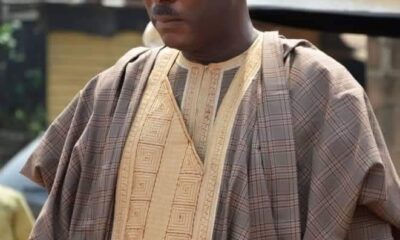Politics
2027 Presidency: 10 Reasons Why Tinubu May Be One-Term President

As Nigeria’s 2027 presidential elections approach, political analysts and insiders speculate that President Bola Ahmed Tinubu may become a one-term president.
This conjecture stems from a variety of factors including internal party dynamics, public dissatisfaction, and geopolitical considerations.
- Political Dynamics within the APC
The All Progressives Congress (APC), Tinubu’s party, is experiencing significant internal strife. Various factions within the party are vying for control, with some powerful members feeling marginalized by Tinubu’s administration.
This internal discord could weaken Tinubu’s position and reduce his chances of securing the party’s nomination for a second term.
- Public Dissatisfaction
Public dissatisfaction with Tinubu’s administration is growing. Many Nigerians are frustrated with the persistent economic challenges, including high unemployment rates, inflation, and a declining standard of living. The administration’s inability to effectively address these issues could drive voters to seek change in the next election.
- Security Concerns
Nigeria continues to grapple with serious security issues, including insurgency in the northeast, banditry in the northwest, and separatist agitations in the southeast. The government’s perceived failure to effectively manage these security challenges has eroded public confidence in Tinubu’s leadership.
- Economic Performance
The economy remains a critical issue for many Nigerians. Despite some efforts to stabilize the economy, the country is still struggling with high inflation, a weak currency, and slow GDP growth. Critics argue that Tinubu’s economic policies have not delivered the promised improvements, leading to widespread discontent.
-
Regional Tensions
Regional tensions also play a significant role. Tinubu, hailing from the southwest, has faced criticism from other regions that feel neglected or underrepresented in his administration. Balancing these regional interests is a complex task, and failure to do so could undermine his support base.
- Opposition Strategies
The opposition parties are gearing up for a fierce contest in 2027. With a unified strategy and a focus on key issues such as security and the economy, the opposition could present a formidable challenge to Tinubu’s re-election bid. Notably, the People’s Democratic Party (PDP) is positioning itself as a viable alternative, capitalizing on the APC’s perceived failures.
-
Corruption Allegations
Corruption remains a pervasive issue in Nigerian politics. Allegations of corruption within Tinubu’s administration could further erode public trust and support. Transparency and accountability are key concerns for voters, and any perceived lack of these could be detrimental to his re-election prospects.
- Civil Society Movements
Civil society organizations and advocacy groups are increasingly vocal about governance issues. These groups have the potential to mobilize public opinion against the current administration, especially if they highlight issues such as human rights abuses, lack of transparency, and poor governance.
- Health Concerns
Tinubu’s health has been a topic of speculation and concern. Any significant health issues could affect his ability to campaign effectively and fulfill the demands of the presidency, thereby influencing voters’ decisions in 2027.
- Ethnic and Religious Factors
Ethnic and religious dynamics are also at play. Nigeria’s diverse ethnic and religious composition means that any perceived favoritism or marginalization can influence voting patterns. Tinubu’s ability to navigate these sensitivities will be crucial.
-

 Breaking News3 years ago
Breaking News3 years agoBREAKING: CBN Redesigns Naira Notes
-

 Breaking News2 years ago
Breaking News2 years agoBREAKING: Tinubu Considers Temporary Subsidy On Petrol
-

 Breaking News1 year ago
Breaking News1 year agoJUST IN: Gbajabiamila Dies In UK
-

 News3 years ago
News3 years agoDrama As Church Gives Certificate Of Virginity To Ladies After Testing Them (See Photos)
-

 Crime3 years ago
Crime3 years agoUproar As Student Teacher On Teaching Practice Impregnates 24 Girls, Headmistress, Four Female Teachers
-

 Breaking News7 months ago
Breaking News7 months agoJUST IN : Sacked Osun LG Chairman Killed Few Minutes After Returning To Office
-

 Breaking News2 years ago
Breaking News2 years agoBREAKING: Dangote Speaks As BUA Reduces Price Of Cement
-

 Crime3 years ago
Crime3 years agoJUST IN: Gunmen Storm Osogbo, Kill Man, Daughter Few Hours After His Wife Put To Bed (Photos)










